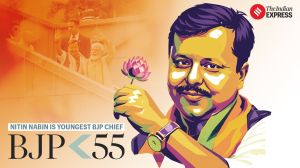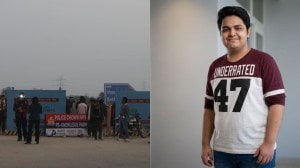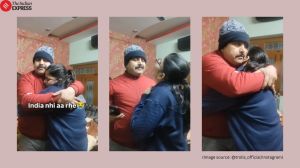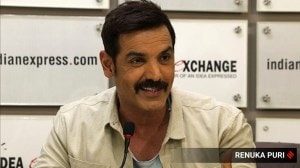Tracking a friendship
The friendship between Rahul Gandhi and Omar Abdullah has been cemented thanks to a shared love of speed riding motor bikes on dirt tracks. ...

The friendship between Rahul Gandhi and Omar Abdullah has been cemented thanks to a shared love of speed riding motor bikes on dirt tracks. Politicians wonder whether the friendship will impact the Congress alliance with Mufti Mohammed Sayeed8217;s PDP in Kashmir. A deep-throat informs that last month Omar met Sonia Gandhi, although no one is willing to confirm the meeting officially.
According to the agreement after the 2002 J038;K Assembly elections, Mufti has to relinquish his chief ministership at the end of this year to a Congress nominee. However, one view is that in national interest the Congress should allow Mufti to continue. Those who advocate this claim that Ghulam Nabi Azad, the most obvious Congress candidate for CM, is in any case reluctant.
If the Congress insists on sticking to the original agreement, Mufti might walk out of the alliance on some pretext. In such an eventuality, the National Conference would be the obvious candidate to fill the breach. Omar has made clear that he believes it would be folly for the Congress to allow the PDP to retain the chief ministership after the year end.
High flying planning
Those working in the Planning Commission quip that the initials R R in the member secretary, Rajiv Ratan Shah8217;s, name actually stand for room renovation. Ever since Shah8217;s arrival in the Commission last May, construction activity on the second and third floor of Yojana Bhawan, where the senior staff sits, has been unending. The original wood work has been replaced by white cedar wood panelling and matching white cedar wood furniture has been ordered as well. Officers8217; bathrooms have also got a facelift with fancy fixtures, smart tiles and marble flooring.
Skeptics suggest that while the Commission keeps an eagle eye on the planning and financial allocations of the government at large, it has been less vigilant on the home front. Of the nine Commission members, almost half-a-dozen are in the habit of flying out of town every other weekend and these are not on official work. Someone calculated that these high flyers make some 30-40 trips annually.
Parivar wars
While most in the BJP watched aghast as the two leading lights of the party slogged it out publicly over the expulsion of Madan Lal Khurana, the families of both sides were egging them on. Advani8217;s family feels that he is entirely responsible for making the BJP what it is today and that he should exert his authority. On the opposite side, Vajpayee8217;s family has a soft corner for Khurana who kept loyally in touch with them in good times and bad.
In a bid to buttress its position, the Advani camp spread word that Vajpayee was being forgetful and had actually been consulted by Jaswant Singh over Khurana8217;s suspension. That Vajpayee still has a grip over the party, when he chooses, is evident from the fact that he won this hotly contested bout. Even though Advani was backed this time by all his handpicked general secretaries cross with Khurana for describing them as people who stick to their air conditioned offices and are out of touch with the ground reality. Some claim the quid pro quo is that Advani would continue undisturbed as president of the BJP till at least the end of the year.
Not schooled for politics
Satyavrat Chaturvedi, Congress general secretary in charge of UP, has explained to Sonia Gandhi that since his views on how to revitalise the party in Uttar Pradesh and those of the UPCC president Salman Khurshid are totally at variance, one of them should be replaced. In the Allahabad bypoll this July the Congress managed only 4 per cent of the votes in the Nehru-Gandhi family8217;s hometown, though it had won an eight per cent vote share in last year8217;s general elections.
Chaturvedi blames the party8217;s slipping popularity on the five-star culture prevalent among the top brass in the state, which has lost contact with the grassroot workers. Khurshid is not swayed by Chaturvedi8217;s arguments. Khurshid8217;s detractors claim that the real source of his influence is not his political acumen but the fact that he is in a position to allocate franchisees for a much sought after public school chain of which he is a trustee.
Old and out of touch
The empanelment of the 1972 batch IAS officers is underway and only a few will make it as full secretaries in the Central Government. The officers are on tenterhooks because their performance is not to be decided on the basis of their confidential records over the last thirty years alone, but is to be judged by a newly-constituted eminent persons committee. The three members of the committee, Abid Hussain, G V Ramakrishnan and R Vasudevan, are all over 75. Most bureaucrats fear that they are out of sync with modern administration, since they worked in an era before internet and e-governance.
Keeping on her right side
While Ram Vilas Paswan8217;s RLD is seen as the weakest link in the UPA alliance in the north and the TRS in Andhra, in Tamil Nadu Dr Ramadoss8217;s PMK is eyed with suspicion by other UPA allies. When Prime Minister Manmohan Singh went to Chennai recently to inaugurate a university for indigenous medicines, Health Minister A Ramadoss insisted on inviting Chief Minister Jayalalithaa. DMK chief M Karunanidhi was upset and boycotted the function, even though Jaya eventually stayed away.
The PMK has a history of switching sides before each election, and UPA allies suspect that it is making alternative plans for April 2006 when the Assembly elections are due.
- 01
- 02
- 03
- 04
- 05































